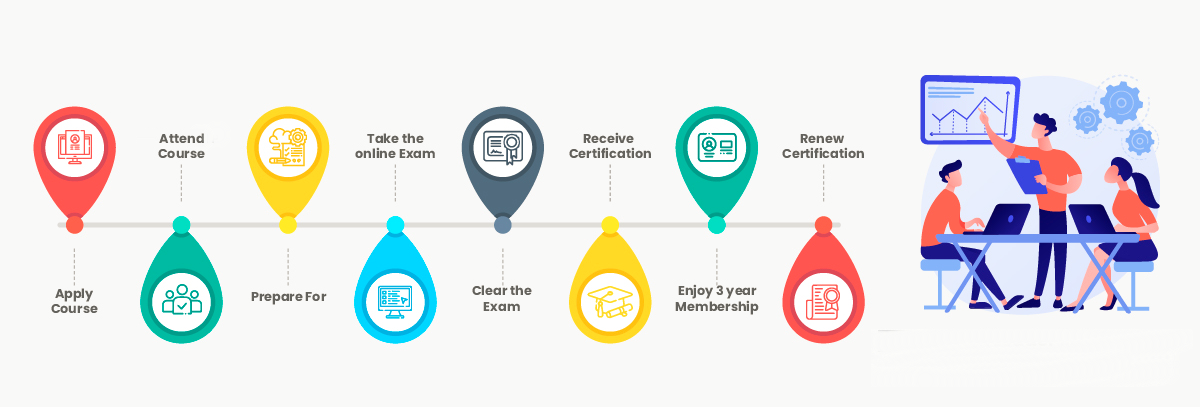
Sambodhi and Education Nest provide a comprehensive Six Sigma (Black Belt) training program, focusing on process improvement techniques. Six Sigma is a proven methodology that aims to improve process output quality by identifying and eliminating defects and reducing variability. The training covers various quality management methods, including empirical and statistical approaches. Each Six Sigma project follows a structured sequence of steps, targeting specific goals such as process time reduction, cost minimization, and enhanced customer satisfaction and profits. The course ensures a clear understanding of each concept through simplified explanations. Upon completion, participants will gain expertise in Six Sigma (Black Belt) and acquire essential fundamentals in this field. The training is led by an experienced and knowledgeable trainer who provides guidance and support throughout the program.
Application Deadline: Jun 30, 2023
Upskill for Your Dream Job
Sambodhi and Education Nest offers a comprehensive Six Sigma (Black Belt) Training Course designed to equip participants with the necessary skills to drive process improvement and achieve operational excellence. Led by industry experts with over 10 years of experience, the course provides live project-based training, ensuring practical application of Six Sigma methodologies. Participants will learn to apply advanced statistical tools, analyze data, identify root causes, and implement effective solutions to enhance organizational efficiency and quality. Our instructors have developed unique teaching styles that facilitate a deep understanding of Six Sigma principles and techniques, enabling aspiring candidates to master the skills needed to lead successful improvement projects. By the end of the course, participants will be prepared to achieve Six Sigma Black Belt certification and make significant contributions to process optimization and overall business success.



Instructor-led Six Sigma (Black Belt) live online Training Schedule
May 15th – Weekend
July 1st – Weekend
Why enroll for Six Sigma (Black Belt) Certificate Training Course?


According to a report by Grand View Research, the Six Sigma market was valued at USD 3.88 billion in 2020 and is expected to grow at a compound annual growth rate (CAGR) of 17.6% from 2021 to 2028.

Six Sigma (Black Belt) professionals are in high demand across MNCs like Ford, P&G, Toyota, Samsung, Honeywell, Caterpillar, and Johnson & Johnson value their expertise for process improvement and operational excellence.

Professionals with a Six Sigma (Black Belt) certification earn competitive salaries, averaging over $107,000 globally. In comparison, Management Analysts have an average annual salary of $87,660.
Six Sigma (Black Belt) Training Course Benefits
The Six Sigma (Black Belt) course offers several benefits. As a Lean Six Sigma Black Belt, you will gain the skills to lead project teams and identify areas for improvement. The course validates your ability to streamline processes and enhance quality. By reducing waste, eliminating bottlenecks, and implementing efficient practices, you will learn how to reduce costs and increase overall efficiency. The field of Six Sigma (Black Belt) offers numerous job opportunities globally, with top companies actively seeking professionals with these skills. The demand for skilled Six Sigma (Black Belt) candidates is consistently rising, making it a lucrative and promising domain for career growth.

Annual Salary

Hiring Companies
Want to become a Six Sigma (Black Belt) Professional.
Why Six Sigma (Black Belt) Certificate Training Course from Education Nest






Six Sigma (Black Belt) Skills Covered
Six Sigma (Black Belt) Training Course Syllabus
The Basics of Six Sigma
The Fundamentals of Six Sigma
Selecting Lean Six Sigma Projects
The Lean Enterprise
Process Definition
Six Sigma Statistics
Measurement System Analysis
Process Capability
Patterns of Variation
Inferential Statistics
Hypothesis Testing
Hypothesis Testing with Normal Data
Hypothesis Testing with Non-Normal Data
Simple Linear Regression
Multiple Regression Analysis
Designed Experiments
Full Factorial Experiments
Fractional Factorial Experiments
Lean Controls
Statistical Process Control (SPC)
Six Sigma Control Plans
The Basics of Six Sigma
The Fundamentals of Six Sigma
Selecting Lean Six Sigma Projects
The Lean Enterprise
Process Definition
Six Sigma Statistics
Measurement System Analysis
Process Capability
Patterns of Variation
Inferential Statistics
Hypothesis Testing
Hypothesis Testing with Normal Data
Hypothesis Testing with Non-Normal Data
Simple Linear Regression
Multiple Regression Analysis
Designed Experiments
Full Factorial Experiments
Fractional Factorial Experiments
Lean Controls
Statistical Process Control (SPC)
Six Sigma Control Plans
Six Sigma (Black Belt) Training Projects

In the retail industry, Six Sigma (Black Belt) projects play a crucial role in improving operational efficiency, customer satisfaction, and overall profitability. These projects aim to identify and eliminate process inefficiencies, reduce waste, optimize inventory management, enhance supply chain processes, and streamline customer service. By applying Six Sigma methodologies, such as DMAIC (Define, Measure, Analyze, Improve, Control), Black Belt professionals can analyze data, identify root causes of issues, and implement effective solutions to enhance the retail experience. Whether it's reducing product defects, improving on-time deliveries, or optimizing the layout of a store, Six Sigma projects in the retail industry drive continuous improvement and contribute to achieving excellence in customer service and operational performance.

In the IT industry, Six Sigma (Black Belt) projects play a crucial role in enhancing operational efficiency, quality control, and customer satisfaction. These projects focus on identifying and eliminating defects, reducing variability, and streamlining processes within IT operations and service delivery. By implementing Six Sigma methodologies, such as DMAIC (Define, Measure, Analyze, Improve, Control), IT organizations can improve software development processes, optimize IT infrastructure, enhance project management practices, and minimize downtime. Six Sigma (Black Belt) professionals in the IT industry utilize statistical tools, data analysis, and process mapping to identify root causes of issues, implement data-driven solutions, and continuously monitor and control process performance. This results in improved service levels, faster response times, reduced costs, and increased overall customer value, making Six Sigma (Black Belt) projects invaluable in driving efficiency and quality in IT operations.
Six Sigma (Black Belt) Training Description
The Six Sigma (Black Belt) course is designed to equip participants with the skills and knowledge needed to drive process improvement and achieve operational excellence. This comprehensive training program covers advanced statistical tools, data analysis techniques, and process improvement methodologies. Participants learn how to identify and eliminate defects, reduce variability, and streamline processes within organizations. The course provides a deep understanding of Six Sigma principles, such as DMAIC (Define, Measure, Analyze, Improve, Control), and equips participants with the ability to lead improvement projects. By completing the course, participants gain the expertise to optimize processes, enhance quality control, and drive positive change within their organizations.
The objectives of the Six Sigma (Black Belt) course are:
Learning the Six Sigma (Black Belt) course offers several compelling reasons:
The Six Sigma (Black Belt) is suitable for a wide range of individuals, including:
The prerequisites for the Six Sigma (Black Belt) course are as follows:
Sambodhi and Education Nest offer a range of Project Management courses to cater to different needs and skill levels. In addition to the Six Sigma (Black Belt) course, they provide the following courses:
Project Management Professional (PMP): This course is designed for experienced project managers who want to obtain the globally recognized PMP certification. It covers the complete project management lifecycle, including initiating, planning, executing, monitoring, controlling, and closing projects.
Project Risk Management: This course delves into the various aspects of project risk management, including risk identification, assessment, mitigation, and monitoring. Participants learn how to effectively manage risks to ensure project success.
Program Management Professional (PgMP): The PgMP course focuses on advanced program management principles, providing professionals with the knowledge and techniques required to manage complex programs and achieve strategic business objectives.
Agile Project Management: This course focuses on Agile project management methodologies, such as Scrum, Kanban, and Lean. Participants learn how to apply Agile principles and practices to enhance project delivery and adapt to changing requirements.
PRINCE2: PRojects IN Controlled Environments 2 (PRINCE2) is a widely used project management methodology. This course equips participants with the knowledge and skills to effectively implement PRINCE2 principles and practices in managing projects.
Primavera P6: This course focuses on Primavera P6, a leading project management software widely used in industries like construction, engineering, and manufacturing. Participants learn how to plan, manage, and control projects using Primavera P6.
These courses offer valuable knowledge and skills for professionals seeking to enhance their project management capabilities and achieve success in their projects.
The Six Sigma (Black Belt) course is designed to equip participants with the skills and knowledge needed to drive process improvement and achieve operational excellence. This comprehensive training program covers advanced statistical tools, data analysis techniques, and process improvement methodologies. Participants learn how to identify and eliminate defects, reduce variability, and streamline processes within organizations. The course provides a deep understanding of Six Sigma principles, such as DMAIC (Define, Measure, Analyze, Improve, Control), and equips participants with the ability to lead improvement projects. By completing the course, participants gain the expertise to optimize processes, enhance quality control, and drive positive change within their organizations.
The objectives of the Six Sigma (Black Belt) course are:
Learning the Six Sigma (Black Belt) course offers several compelling reasons:
The Six Sigma (Black Belt) is suitable for a wide range of individuals, including:
The prerequisites for the Six Sigma (Black Belt) course are as follows:
Sambodhi and Education Nest offer a range of Project Management courses to cater to different needs and skill levels. In addition to the Six Sigma (Black Belt) course, they provide the following courses:
Project Management Professional (PMP): This course is designed for experienced project managers who want to obtain the globally recognized PMP certification. It covers the complete project management lifecycle, including initiating, planning, executing, monitoring, controlling, and closing projects.
Project Risk Management: This course delves into the various aspects of project risk management, including risk identification, assessment, mitigation, and monitoring. Participants learn how to effectively manage risks to ensure project success.
Program Management Professional (PgMP): The PgMP course focuses on advanced program management principles, providing professionals with the knowledge and techniques required to manage complex programs and achieve strategic business objectives.
Agile Project Management: This course focuses on Agile project management methodologies, such as Scrum, Kanban, and Lean. Participants learn how to apply Agile principles and practices to enhance project delivery and adapt to changing requirements.
PRINCE2: PRojects IN Controlled Environments 2 (PRINCE2) is a widely used project management methodology. This course equips participants with the knowledge and skills to effectively implement PRINCE2 principles and practices in managing projects.
Primavera P6: This course focuses on Primavera P6, a leading project management software widely used in industries like construction, engineering, and manufacturing. Participants learn how to plan, manage, and control projects using Primavera P6.
These courses offer valuable knowledge and skills for professionals seeking to enhance their project management capabilities and achieve success in their projects.
Six Sigma (Black Belt) Training Course reviews
Read learner testimonials
Anita C.
Highly recommended! This well-organized course provides comprehensive coverage of a wide range of Six Sigma (Black Belt) topics. The instructor's thorough explanations and use of examples greatly enhance understanding and retention of the material. The course is easy to follow, allowing participants to grasp the concepts effectively. Whether you are new to Six Sigma or looking to enhance your existing knowledge, this course offers valuable insights and practical applications. Don't miss the opportunity to gain a deeper understanding of Six Sigma (Black Belt) and advance your skills in process improvement and quality management.
Tejas G
The instructors at Sambodhi and Education are highly knowledgeable and experienced in Six Sigma. Their professionalism and real-life expertise make them the perfect source to learn from. The trainers are polite, patient, and provide clear explanations of the modules, supplementing them with relevant examples. Their approach ensures a positive and effective learning experience for all participants.
Michał C.
I want to express my heartfelt gratitude to Sambodhi and Education Nest for providing me with this incredible opportunity to pursue the Six Sigma (Black Belt) course. It has been a transformative experience, and I am grateful for the knowledge and skills I have gained. This online certification has opened new doors of opportunity for me, and I wholeheartedly give it a 5-star rating. Thank you once again!
Hear from our learners
Lorem ipsum dolor sit amet, consectetur adipiscing elit. Ut elit tellus, luctus nec ullamcorper mattis, pulvinar dapibus leo.
Lorem ipsum dolor sit amet, consectetur adipiscing elit. Ut elit tellus, luctus nec ullamcorper mattis, pulvinar dapibus leo.
Lorem ipsum dolor sit amet, consectetur adipiscing elit. Ut elit tellus, luctus nec ullamcorper mattis, pulvinar dapibus leo.
Like what you hear from our learners?
Creating Epic Presentations: Communicating Powerful Ideas reviews
Six Sigma (Black Belt) Training FAQs
If you miss an online Six Sigma (Black Belt) Training class, it’s important to reach out to the instructor or the support team of the online training platform you are using. They may be able to provide you with a recording or transcript of the missed class, so that you can catch up on what you missed. Alternatively, some platforms offer on-demand access to class materials, so you can go back and review the content on your own time. It’s always a good idea to try and make up the missed material as soon as possible, so that you don’t fall behind in your learning.
If you have queries after completing an online Six Sigma (Black Belt) Training course, Education Nest training platforms offer some form of post-course support. This may include access to a dedicated support team, a community forum where you can ask questions and connect with other learners, or even one-on-one sessions with an instructor or coach. If you have specific questions or concerns related to the course material, you can reach out to the instructor directly or use the support channels provided by the platform. It’s always a good idea to clarify any doubts or questions you may have, as this will help to solidify your understanding of the material and ensure that you can apply what you’ve learned in a real-world context.
Six Sigma (Black Belt) is a methodology and a level of expertise within the broader Six Sigma approach, which is a data-driven approach to process improvement. It focuses on achieving operational excellence and minimizing defects or errors in business processes. The term “Black Belt” refers to individuals who have undergone comprehensive training and acquired advanced knowledge in the application of Six Sigma principles and tools. They possess the skills to lead improvement projects, analyze data, identify root causes of problems, and implement solutions to enhance process efficiency and quality. Six Sigma Black Belts play a crucial role in driving continuous improvement and achieving measurable results within organizations.
The timing of when you get access to learning content after signing up for an online Six Sigma (Black Belt) Training course will depend on the specific training platform you are using. In most cases, you should receive access to the learning content immediately upon signing up, or shortly after your payment has been processed. Some platforms may require you to complete an enrolment process or set up an account before you can access the content. It’s always a good idea to check the specific details of the course or platform you are using, as the timing and process may vary. If you are experiencing any issues accessing the learning content, you should contact the support team of the training platform for assistance.
Once you enrol in Six Sigma (Black Belt) Training course, you will typically have access to the course material for as long as the course remains available on the platform. This means that you can revisit the material at any time, even after you have completed the course, and continue to learn and improve your skills. The benefit of lifetime access to the learning material is that it allows you to learn at your own pace and on your own schedule. You can review the content as many times as you need to fully understand the concepts and techniques covered in the course. Additionally, if you encounter a new challenge in your work or personal life, you can go back to the course material to find solutions and strategies to help you overcome the challenge. Having access to course material for a lifetime is a valuable benefit, as it allows you to continue to improve your skills and knowledge long after you have completed the course. So, if you are interested in improving your Communication skill, build confidence and want the flexibility to learn at your own pace, consider enrolling in Six Sigma (Black Belt) Training course that offers lifetime access to the learning material.
If you miss an online Six Sigma (Black Belt) Training class, it’s important to reach out to the instructor or the support team of the online training platform you are using. They may be able to provide you with a recording or transcript of the missed class, so that you can catch up on what you missed. Alternatively, some platforms offer on-demand access to class materials, so you can go back and review the content on your own time. It’s always a good idea to try and make up the missed material as soon as possible, so that you don’t fall behind in your learning.
If you have queries after completing an online Six Sigma (Black Belt) Training course, Education Nest training platforms offer some form of post-course support. This may include access to a dedicated support team, a community forum where you can ask questions and connect with other learners, or even one-on-one sessions with an instructor or coach. If you have specific questions or concerns related to the course material, you can reach out to the instructor directly or use the support channels provided by the platform. It’s always a good idea to clarify any doubts or questions you may have, as this will help to solidify your understanding of the material and ensure that you can apply what you’ve learned in a real-world context.
Six Sigma (Black Belt) is a methodology and a level of expertise within the broader Six Sigma approach, which is a data-driven approach to process improvement. It focuses on achieving operational excellence and minimizing defects or errors in business processes. The term “Black Belt” refers to individuals who have undergone comprehensive training and acquired advanced knowledge in the application of Six Sigma principles and tools. They possess the skills to lead improvement projects, analyze data, identify root causes of problems, and implement solutions to enhance process efficiency and quality. Six Sigma Black Belts play a crucial role in driving continuous improvement and achieving measurable results within organizations.
The timing of when you get access to learning content after signing up for an online Six Sigma (Black Belt) Training course will depend on the specific training platform you are using. In most cases, you should receive access to the learning content immediately upon signing up, or shortly after your payment has been processed. Some platforms may require you to complete an enrolment process or set up an account before you can access the content. It’s always a good idea to check the specific details of the course or platform you are using, as the timing and process may vary. If you are experiencing any issues accessing the learning content, you should contact the support team of the training platform for assistance.
Once you enrol in Six Sigma (Black Belt) Training course, you will typically have access to the course material for as long as the course remains available on the platform. This means that you can revisit the material at any time, even after you have completed the course, and continue to learn and improve your skills. The benefit of lifetime access to the learning material is that it allows you to learn at your own pace and on your own schedule. You can review the content as many times as you need to fully understand the concepts and techniques covered in the course. Additionally, if you encounter a new challenge in your work or personal life, you can go back to the course material to find solutions and strategies to help you overcome the challenge. Having access to course material for a lifetime is a valuable benefit, as it allows you to continue to improve your skills and knowledge long after you have completed the course. So, if you are interested in improving your Communication skill, build confidence and want the flexibility to learn at your own pace, consider enrolling in Six Sigma (Black Belt) Training course that offers lifetime access to the learning material.
Be future ready, start learning